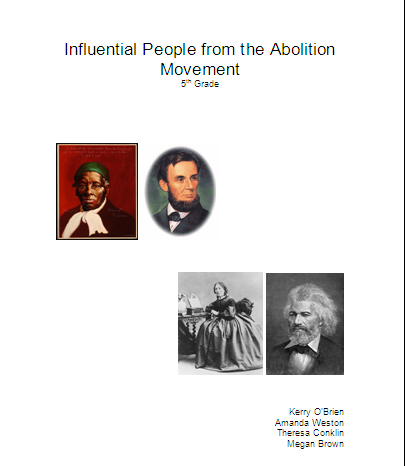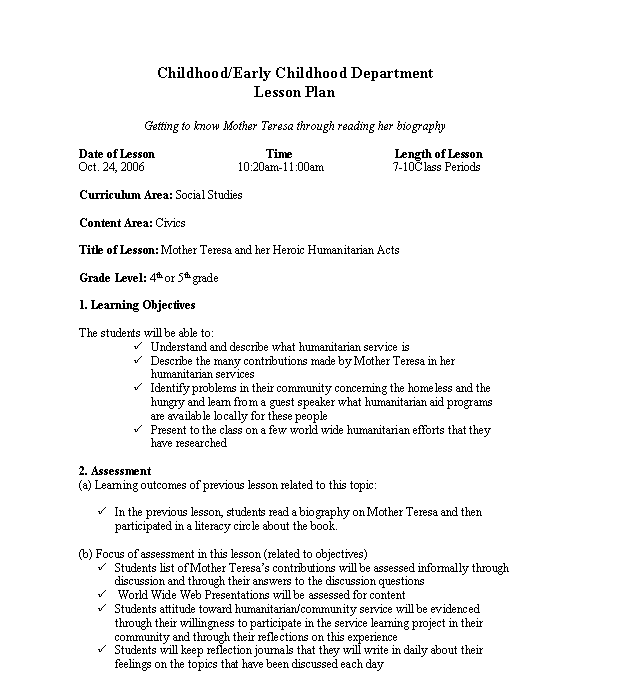EDU 375
Throughout this semester we
have been building a multimedia portfolio to document our learning in
TMB-Thematic Method Block. In order to do this for EDU 375, which is
our Social Studies class we were required to choose several pieces of
evidence or in other words work that we have done throughout this
semester that
shows that we have met the following three broad course goals:
Evidence in Support of # 1:
| 1. Developed an understanding of
the scope and breadth of social studies topics and ideas that need to
be covered in the elementary school curriculum. |
| 2. Explored multiple
perspectives of social studies topics, addressed diverse learning needs
of learners, and construct hands-on social studies activities
which support New York State Social Studies Learning Standards and NCSS Standards. |
| 3. Explored the strategies of
developing an interdisciplinary approach to social studies instruction. |
Evidence in Support of # 1:
Unit
Plan on the Influential Leaders of the Abolition Movement!

*Click on Picture
Evidence
in Support of # 2:
*Click on Picture
Reflection: I believe that I met this objective
by creating the above unit plan on influential leaders of the abolition
movement. There is a
great amount of topics and information that are available on the topic of the abolition movement, however, throughout this
unit I had to carefully select some of the topics and information dealing with the abolition movement and its leaders that I
believed was most important for students to know, but at the same time I had to make sure that it tied in with the other
lessons in the unit! The lesson in this unit that I personally created was on Abraham Lincoln and his writing of the
Emancipation Proclamation.This lesson had a more in depth focus on the Emancipaton Proclamation itself, rather than on
Lincoln as a person, however I did focus briefly on Lincoln himself. This is because I felt that yes Lincoln was important for
students to learn about, but it was more important that the students have a basic understanding of the Emancipation
Proclamation document itself, which so greatly altered our past!
great amount of topics and information that are available on the topic of the abolition movement, however, throughout this
unit I had to carefully select some of the topics and information dealing with the abolition movement and its leaders that I
believed was most important for students to know, but at the same time I had to make sure that it tied in with the other
lessons in the unit! The lesson in this unit that I personally created was on Abraham Lincoln and his writing of the
Emancipation Proclamation.This lesson had a more in depth focus on the Emancipaton Proclamation itself, rather than on
Lincoln as a person, however I did focus briefly on Lincoln himself. This is because I felt that yes Lincoln was important for
students to learn about, but it was more important that the students have a basic understanding of the Emancipation
Proclamation document itself, which so greatly altered our past!
Unit Plan on the
Influential Leaders of the Abolition Movement!

*Click on Picture
Reflection: Once again I believe that in completing this unit plan on the leaders of the abolition movement I met this course objective in
many ways. To begin with, this unit plan explored the abolition movement through the perspectives of its many leaders such
as Harriet Tubman, Harrite Beecher Stowe, Fredrick Douglass and also Abraham Lincoln. Also, through out this unit we used
many different methods (reading, writing, discussing, hands on activities and researching) and many different tools
(computers, books, and activity sheets) to accommodate the many diverse learning needs of our students. Also, as I
mentioned above we created hands-on activities throughout our unit to aid in student learning, which support the New York
State Learning Standards.
Evidence in Support of # 3:

*Click on Picture
Reflection: Once again I believe that in completing this unit plan on the leaders of the abolition movement I met this course objective in
many ways. To begin with, this unit plan explored the abolition movement through the perspectives of its many leaders such
as Harriet Tubman, Harrite Beecher Stowe, Fredrick Douglass and also Abraham Lincoln. Also, through out this unit we used
many different methods (reading, writing, discussing, hands on activities and researching) and many different tools
(computers, books, and activity sheets) to accommodate the many diverse learning needs of our students. Also, as I
mentioned above we created hands-on activities throughout our unit to aid in student learning, which support the New York
State Learning Standards.
Evidence in Support of # 3:
*Click on Picture
Reflection:
It is my belief that it is very important for a teacher to try to
incorporate many different subjects into their lessons and by this
I mean that I am in support of the interdisciplinary approach to teaching. For example, a social studies lesson does not have
to deal just with topics of social studies, it can also incorporate aspects of language arts, math, science, etc. We took an
interdisciplinary approach when we created out children's book project. This lesson combined the reading of a children's
book and social studies lesson. For this project I personally did a lesson on Mother Teresa based on a children's book on her.
Using a children's book biography is a fun and easy way to combine language arts and social studies into one lesson instead
of just presenting biographic information on a person! In this lesson I felt that it was much more useful for students to
personally read about Mother Teresa and learn about all the wonderful things she did for millions of poor people around the
world, instead of me chosing information that I thought was important and just presenting it to them. So in combing these
two subjects into one lesson I was able to further my students experience in reading non-fiction and
also have them learn about an important person in the history of the United States and further more the world!
I mean that I am in support of the interdisciplinary approach to teaching. For example, a social studies lesson does not have
to deal just with topics of social studies, it can also incorporate aspects of language arts, math, science, etc. We took an
interdisciplinary approach when we created out children's book project. This lesson combined the reading of a children's
book and social studies lesson. For this project I personally did a lesson on Mother Teresa based on a children's book on her.
Using a children's book biography is a fun and easy way to combine language arts and social studies into one lesson instead
of just presenting biographic information on a person! In this lesson I felt that it was much more useful for students to
personally read about Mother Teresa and learn about all the wonderful things she did for millions of poor people around the
world, instead of me chosing information that I thought was important and just presenting it to them. So in combing these
two subjects into one lesson I was able to further my students experience in reading non-fiction and
also have them learn about an important person in the history of the United States and further more the world!
